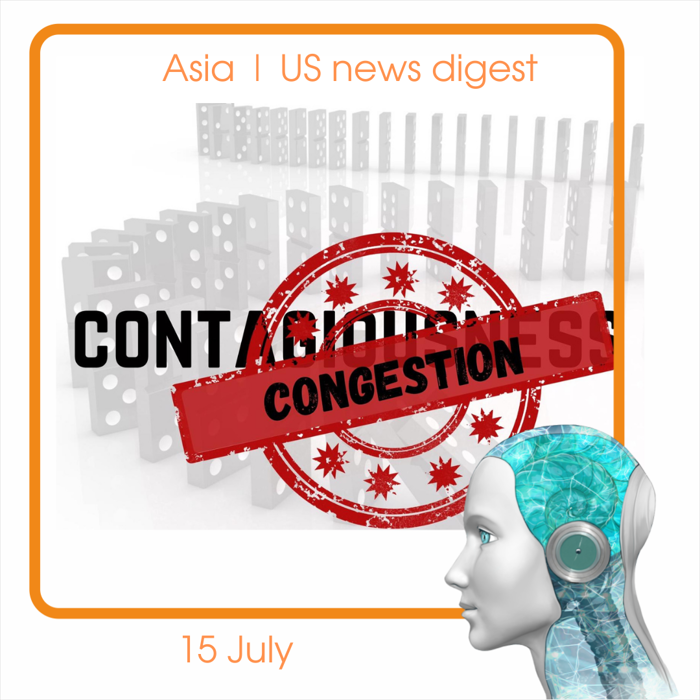Asia | US news digest. 15 July
As contagious as COVID-19, congestions spill worldwide aiming at new targets – developing countries and low-margin businesses.
The global congestion is on the roll. Recent data ranks the world’s main ports according to the most congested box spots among which are Hong Kong, Oakland, Savannah, Seattle, and Vancouver. In addition, experts have estimated that currently 10% of the world’s shipping capacity has been taken out due to port congestion issues. The famous Yantian’s congestion that has only recently been eased up continues shaking up the industry this time with schedule changes. It has also revealed such pain spots as the traffic situation and extra transfers between PRD terminals.
Consequently, unsustainable container shipping prices significantly filter down through supply chains and as the result, most imported goods are expected to achieve sizeable increases in prices in the coming months. Apart from Brexit and COVID already impacting the market, experts warn about risks that will hit low-margin businesses in particular. The situation is devastating for all players, but the ones coming from developing countries suffer the most. For many of them, the tariffs are prohibitive and they cannot ship their products. Many countries are being sidelined as major shipping lines are not calling at their ports anymore.
As the means of facilitating healthier competition and restricting the increased influence of big companies, the Federal Maritime Commission and the Department of Justice Antitrust Division have signed an interagency Memorandum of Understanding amid to increase cooperation on oversight of the ocean liner shipping industry. The step demonstrates the government’s intention to flip the tables and change the rules of the game towards a fairer environment.
In a world where everything is interconnected, the devastating effect of one disruptor causes a domino effect for other facilities. The Port of Vancouver is continuing to suffer from the consequences of wildfires in British Columbia. Rail backlog at the port remains substantial.
Trying to ease the export backlog, the Chittagong Port Authority uses its own methods – it has approved plying of four new feeder vessels in the Chittagong-Colombo route. In turn, Maersk has taken huge booking of containers although it has no feeder vessels in this route.
Vietnam has been on the rise in terms of international trade, however, the shut down of Ho Chi Minh City that used to be one of the busiest harbors has become a major drawback. There is still good news – rail in Asia is doing well. Even with prices increased, it turns out to be the most reliable way to ship goods from Asia to Europe because of the efficient network.
Such industry giants as Maersk and COSCO continue conducting a rigorous policy – it is now planning to order up to a dozen 15,000 TEU methanol-fuelled container ships at Hyundai Heavy Industries. COSCO, ONE, Yang Ming follow suit and plan to kick off new sizable deals.
Good news commemorate air freight with FAA has finally extended the exemption which allows passenger aircraft to carry cargo in the cabin after years of Airlines for America members unsuccessfully requesting it. The positive change will contribute to the move on cargo capacity, which is extremely vital for the existing constraints.
Evergreen Marine Corporation is on a mission to expand its fleet, including subsidiaries, by splashing out nearly $40m for 6,000 refrigerated containers from China. The move is planned to improve its competitiveness and bring it back on track after the crisis.
Even such giants targeting mass consumption as Walmart join in the green agenda. It plans to add a pillar to its Project Gigaton effort to reduce supplier emissions that is focused specifically on transportation partners. Within the framework of the Project, it is expected to cumulatively avoid one billion metric tons of greenhouse gases in scope 3 emissions by 2030.
The US ports continue to set records in handling TEU. This time it is Port of Charleston that managed 2.55 million containers, representing a 10% increase from last year. For Port Houston, it has been a total of 292,627 TEUs for June.
Meanwhile, the Montreal Port Authority is preparing to expand its Contrecœur terminal. Its favorable industrial zoning and location near rail and highway access will enable the new facility to become an eco-friendly opportunity for private partners.

